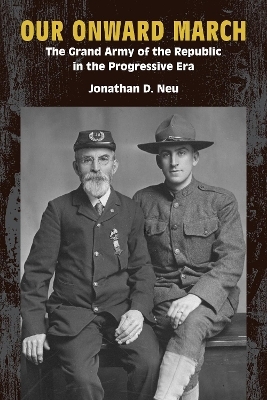
Our Onward March
The Grand Army of the Republic in the Progressive Era
Seiten
2025
Fordham University Press (Verlag)
978-1-5315-0900-2 (ISBN)
Fordham University Press (Verlag)
978-1-5315-0900-2 (ISBN)
- Noch nicht erschienen (ca. Februar 2025)
- Versandkostenfrei innerhalb Deutschlands
- Auch auf Rechnung
- Verfügbarkeit in der Filiale vor Ort prüfen
- Artikel merken
Provides vital new evidence that Union veterans remained stubbornly opposed to the nation’s reconciliationist tendencies and unwilling to surrender the causes for which they fought
Union soldiers’ service to the nation did not end in 1865. Instead, it persisted well into the twentieth century as hundreds of thousands of veterans joined the Grand Army of the Republic (GAR) and directed the reform and improvement of their communities through their fraternal membership in thousands of local posts around the country.
In Our Onward March, Jonathan D. Neu shows how Union veterans of the GAR drew on lessons they learned in the Civil War—lessons about broad principles like democracy, freedom, and loyalty—to undertake grassroots civic projects designed to address the rampant social ills and challenging foreign policy issues associated with US modernization. Armed this time with sage wisdom and unwavering principles, they mobilized again to consummate their wartime victory with reform-minded activism on behalf of establishing an even more perfect Union.
Extending the boundaries of America’s post–Civil War era, Neu investigates the GAR during the Progressive era, a period in the organization’s history that scholars have overlooked. Countering stubborn notions that the GAR was merely a pension advocacy group or an insular bastion of sentimental nostalgia, he reveals instead that the organization reached a turning point in 1890, after which it became an active and decentralized civic association whose members worked to instill a commitment to public life, engagement with community issues, and pride in the democracy they had defended as young men.
Anchored by illuminating new source material, including post-minute books and fraternal records, Our Onward March places aging GAR members squarely among the diverse constellation of turn-of-the-century social reformers, using their memory of the Civil War to promote robust, veteran-led civic engagement. By situating Union veterans in this context, we see a more accurate portrait of the GAR post in American culture—as a local center of progressive activism.
Union soldiers’ service to the nation did not end in 1865. Instead, it persisted well into the twentieth century as hundreds of thousands of veterans joined the Grand Army of the Republic (GAR) and directed the reform and improvement of their communities through their fraternal membership in thousands of local posts around the country.
In Our Onward March, Jonathan D. Neu shows how Union veterans of the GAR drew on lessons they learned in the Civil War—lessons about broad principles like democracy, freedom, and loyalty—to undertake grassroots civic projects designed to address the rampant social ills and challenging foreign policy issues associated with US modernization. Armed this time with sage wisdom and unwavering principles, they mobilized again to consummate their wartime victory with reform-minded activism on behalf of establishing an even more perfect Union.
Extending the boundaries of America’s post–Civil War era, Neu investigates the GAR during the Progressive era, a period in the organization’s history that scholars have overlooked. Countering stubborn notions that the GAR was merely a pension advocacy group or an insular bastion of sentimental nostalgia, he reveals instead that the organization reached a turning point in 1890, after which it became an active and decentralized civic association whose members worked to instill a commitment to public life, engagement with community issues, and pride in the democracy they had defended as young men.
Anchored by illuminating new source material, including post-minute books and fraternal records, Our Onward March places aging GAR members squarely among the diverse constellation of turn-of-the-century social reformers, using their memory of the Civil War to promote robust, veteran-led civic engagement. By situating Union veterans in this context, we see a more accurate portrait of the GAR post in American culture—as a local center of progressive activism.
Jonathan D. Neu holds a PhD in history from Carnegie Mellon University and works in publishing. His writings have appeared in the Pittsburgh Post-Gazette, Gettysburg Magazine, Annals of Iowa, and in the volume The War Went On. He lives in Pittsburgh, Pennsylvania.
| Erscheint lt. Verlag | 4.2.2025 |
|---|---|
| Reihe/Serie | Reconstructing America |
| Zusatzinfo | 12 b/w illustrations |
| Verlagsort | New York |
| Sprache | englisch |
| Maße | 152 x 229 mm |
| Themenwelt | Geschichte ► Allgemeine Geschichte ► Neuzeit (bis 1918) |
| Geisteswissenschaften ► Geschichte ► Regional- / Ländergeschichte | |
| Sozialwissenschaften ► Ethnologie | |
| Sozialwissenschaften ► Politik / Verwaltung | |
| Sozialwissenschaften ► Soziologie | |
| ISBN-10 | 1-5315-0900-2 / 1531509002 |
| ISBN-13 | 978-1-5315-0900-2 / 9781531509002 |
| Zustand | Neuware |
| Informationen gemäß Produktsicherheitsverordnung (GPSR) | |
| Haben Sie eine Frage zum Produkt? |
Mehr entdecken
aus dem Bereich
aus dem Bereich
Giordano Bruno - ein ketzerisches Leben
Buch | Hardcover (2024)
C.H.Beck (Verlag)
29,90 €


